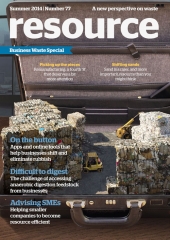Nelson's Column: Resource revenue
Recently, there has been talk of improving the share of revenue that local authorities get from recycling. It’s an idea to be applauded, though playing the markets is a bit of a gamble.
 This article was taken from Issue 77
This article was taken from Issue 77As we all know, better quality recyclate attracts a better price, so a step like this ought to provide additional motivation to reduce contamination. Connecting councils with financial rewards for improved communications has the potential to do this. (Though this column thinks those managing the comms should be personally rewarded for improving or maintaining quality.)
But caution should be exercised before we get too excited about the potential for revenue sharing. Those forecasting the revenue they’ll get from material sales have to factor in the potential for cherry pickers. Conceivably, as the price of secondary resources continues to rise, retailers will become interested in getting the packaging back – or at least the valuable bits.
The real power to disrupt the current collections status quo is the rise of online grocery shopping. Now Ocado, Tesco et al have a fleet of vehicles dropping to a growing number of households, then returning to base only with unwanted carrier bags in place of the goods they’ve delivered. Surely it’s only a matter of time before one of these retailers rethinks its delivery vehicle to fill all that space with aluminium, PET, HDPE, et cetera (whilst leaving only the worthless dregs for councils to collect). The economic logic of this sort of reverse logistics makes sense.
In return, the householder would get reward points with a scheme that she has really bought into. And the big retailers are much more skilled at this incentives game than councils, who have only recently begun trialling ad hoc initiatives. Of course, this is little more than speculation, but those forecasting collection schemes for the next decade would do well to hedge their bets.






